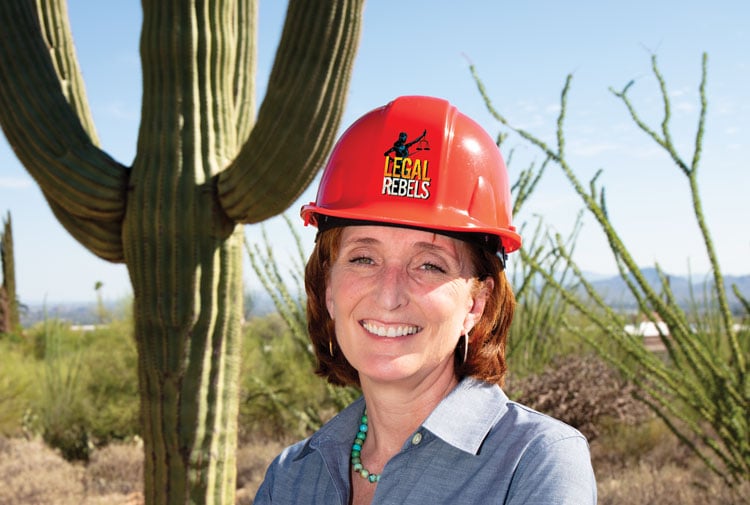By Angela Morris

Photograph of Michele Mirto by Bob Torrez Photography.
Working for a legal aid provider out of college showed Mirto, 54, that her destiny was a public interest law career. She’s worked in legal aid ever since, earning her degree from the University of Dayton School of Law in 1991. But it wasn’t until 2017 that she learned she’d end up turning the legal aid business model on its head—for the better.
As executive director of Step Up to Justice, a Tucson, Arizona-based privately funded legal aid nonprofit, Mirto wields a shoestring budget and just three staff members armed with legal technology. They lead an army of volunteer lawyers in resolving low-income clients’ civil matters—mostly family law but also guardianship, consumer law, bankruptcy, and wills and probate.
You can’t remake the legal aid model without leadership from someone with vision who’s willing to take risks, says Stacy Butler, board president of Step Up to Justice. She believes the nonprofit wouldn’t be successful without Mirto at the helm.
“She’s a really impressive person, and her work ethic is remarkable,” explains Butler. “Michele probably worked seven days per week our first full year.”
The Step Up to Justice budget—$215,000 in 2017—is 95 percent smaller than the average $4 million budget of a legal aid provider, which typically employs an average of 62 staff, she says. In 2017, Mirto’s firm provided $1 million worth of free legal services as its staff coordinated 114 volunteer lawyers to serve 1,000 clients—a 20 percent increase in civil legal services in Pima County. Step Up to Justice closes cases for $215, rather than $1,800 per case, which is the cost of traditional legal aid providers, she says.
“It’s a different model,” Mirto says. “Our staff is not in itself delivering the legal services, so it’s a huge cost savings.”
The technology fueling Step Up to Justice includes a case information system fed by a database about clients, donors and lawyers. Users log on remotely to create case notes and share documents without traveling to the office—giving lawyers more work time and clients less hassle.
Mirto had worked for 22 years at Southern Arizona Legal Aid’s Volunteer Lawyers Program. “To take that leap of faith felt risky, but also the right thing to do,” she says. “There really needed to be some structure in place to fill the gap in services in the community.”
Step Up to Justice’s private funding model frees it of the restrictions on undocumented clients and certain case types that federally funded providers face. It also gives the community a second provider to represent a client who is conflicted out of the traditional provider when they are already representing an opposing party.
Mirto is a visionary, says Tucson family attorney Randi Burnett, who worked under her at Southern Arizona Legal Aid from 2007 to 2012 and now volunteers as a board member at Step Up to Justice.
“She’s one of these incredible people who has the ability to envision the future and come up with these new ideas,” says Burnett, a shareholder in Waterfall, Economidis, Caldwell, Hanshaw & Villamana. “Because of the drive and vision and natural personality—how she is—it’s easy to work with her.”
Legal aid is Mirto’s passion in life, Burnett says.
“She wants a legacy in the community,” Burnett says, “that we made life better for all these people.”